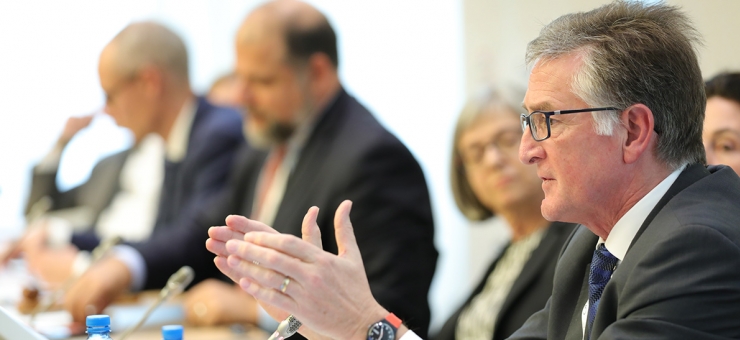UNI GS to WTO: Global Deal & SDGs, a silver bullet to change the rules of the game for workers

Photo copyright WTO/Jay Louvion
UNI Global Union General Secretary Philip Jennings, speaking on a high level panel at the WTO this week, backed the Global Deal as an engine of change coupled with the SDGs. Jennings also underlined the primary role of the ILO as the home of labour standards, and called on the tripartite organisation to be heard on trade and the multiple trade deals that are being negotiated behind closed doors at the WTO and elsewhere.
Responding to a Bangladesh government official speaking from the floor, Jennings pulled no punches, describing the Bangladesh Accord as a blueprint for a sustainable global supply chain promoting decent work. He dismissed claims by the Bangladeshi official that the Accord had been usurped by a Bangladesh government initiative as wholly inaccurate. The new Bangladesh Accord will take effect next year after the original Accord completes its successful five-year mandate. The new Accord will run a further three years and continues UNI and partners commitment to make safe Bangladeshi garment workers’ conditions . Almost 50 brands have already signed up to the new Accord.
Jennings said, “We look forward to the time when an Accord is no longer necessary but until that time we are committed to changing the rules of the game for Bangladeshi garment workers on the ground. There is currently no viable alternative.”
Jennings added, “Everywhere around the world, including Bangladesh, workers’ rights are under-attack – unprotected by effective labour laws, denied the rights of freedom of association, collective bargaining or the right strike. One in two are in vulnerable work; there are record levels of children forced to work, 152 million, and there are more slaves today than at the height of the 1800s slave trade.
“That’s the grinding and shocking truth. However, the Global Deal and the magnificent 17 SDGs which the Deal reflects show there is a better way. Together with COP21 on environmental change, they represent a silver bullet that can change our society. Social dialogue and unions are central to this new narrative, as is the ILO and its labour standards. The global unions have more than 200 global agreements with companies who are now being held to account on their worker and human rights. Even the G20 has said violations of decent work cannot be part of the competition.”
The ILO’s Deputy Director-General Deborah Greenfield, said there was almost no topic as important to the ILO as social dialogue which is embedded in the organisation’s DNA and shapes its priorities.
Greenfield said, “Social dialogue rests on the simple principle that those who are most affected by decisions must be allowed to participate in them and therefore they must have a seat at the table. There is a strong business case for social dialogue and linked to that is the need for training to fill the skills gap that we see growing in the new world of work.”
Jennings also addressed the challenges of the new world of work, calling it the age of transformation.
“We have to put the future of work firmly at the centre of the economic policy agenda - policy-makers cannot continue to bury their heads in the sand. It has been ignored for too long under the neo-liberal agenda. There is a digital issue, an inclusion issue and a trade issue. Labour rights must be adequately addressed in trade agreements such as TiSA, which is not the case now. What is missing is a strong social pillar and the Global Deal is one way we can fight back. We’re glad that the IMF and the World Bank are finally admitting that where unions do not have a voice inequality is worse – what’s required now is action,” Jennings added.
Sweden’s Minister for EU Affairs and Trade, Oscar Stenström said, “We need the Global Deal to tackle inequality – we have, as a society, failed to fairly redistribute the fruits of global wealth.”
Other speakers at the WTO Public Forum 2017 session, “Sharing in the gains from trade – the role of social dialogue and the Global Deal” were World Bank Senior Director of Trade and Competitiveness, Anabel Gonzalez; WTO Chief Economist, Robert Koopman; and the Head of Labour Affairs for Scania, Sofia Vahlne. The session was moderated by Financial Times World Trade Editor, Shawn Donnan.
The Global Deal partnership was developed by Swedish Prime Minister Stefan Löfven in cooperation with the ILO and the OECD. The partnership was launched 21 September 2016 by a core group of partners.
Global Deal explainer https://www.youtube.com/watch?v=dE-7Gtn7baM
The Global Deal is a global partnership with the objective of jointly addressing the challenges in the global labour market and enabling all people to benefit from globalisation. The Global Deal is a multi-stakeholder partnership in line with Goal 17 (“partnerships for the goals”) in the UN 2030 Agenda for sustainable development. It is also a concrete input to several of the other goals, not least goal 8 on decent work and inclusive growth and goal 10 on inequalities.

